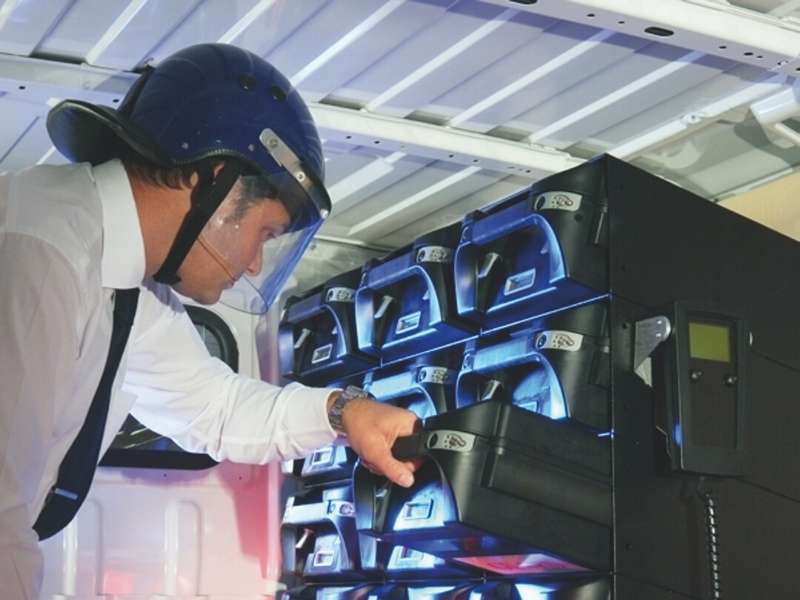
Cash & Valuables in Transit criteria
Companies wishing to join the BSIA's Cash and Valuables in Transit Section must meet the following criteria in order to be admitted to the section:
Must satisfy the Operating Board that they are in possession of a valid certificate issued by an accredited certification body to BS EN ISO 9001 UKAS certification incorporating the current versions of both BS 7872 and BS 7858 throughout their period of membership.
Note: This can be either from a certification body with BS 7872 and BS 7858 within its UKAS accredited scope or an NSI certificate of inspection to BS 7872 and BS 7858 together with BS EN ISO 9001 certification from an accredited certification body and maintained.
Members and applicants for membership of the Cash and Valuables in Transit Section should be compliant with the British Security Industry Association Cash in Transit Effective Practice Guidelines as detailed in Annex F.3.1.
Members of the Cash and Valuables in Transit Section employing individuals in Cash in Transit duties shall maintain a compensation scheme for its full time employees offering as a recommended minimum; £45,000 or as an absolute minimum of 1 times their annual salary in the event of death or permanent physical disability resulting from a criminal attack whilst engaged in the execution of their duties (such compensation can come from either pension scheme or a separate insurance scheme or a combination of both).
BSIA members shall adhere to the Standards of Ethics stated in the Articles and the Model Section Rules and the “Code of ethics for BSIA Members - Supplementary Annex for all sections” (Form 355).
Standards applicable
Alarms Standards
BS EN 50131/PD 6662 “Scheme for the application of European Standards for intrusion and hold-up alarm systems”.
BS 8243 “Intruder and hold-up alarm systems – Management of false alarms – Code of practice”.
BS 9263 “Intruder and hold-up alarm systems – Commissioning, maintenance and remote support – Code of practice”.
VSS Standards
NCP 104 “NSI code of practice for design, installation and maintenance of CCTV surveillance systems”.
BS 8418 “Design, installation, commissioning and maintenance of detector-activated video surveillance systems (VSS) - Code of practice”.
BS EN 62676 suite of International Standards on Video Surveillance Systems (VSS)
Alarm Receiving Centre Standards
BS 5979 - “Remote centres receiving signals from fire and security systems. Code of practice” or BS EN 50518 "Monitoring and Alarm Receiving Centre".
BS 9518 "Processing of alarm signals by an alarm receiving centre. Code of practice"
BS 7858 – “Screening of individuals working in a secure environment – Code of practice”
NSI Gold
BS EN ISO 9001 “Quality management systems. Requirements”.
ISO 14001 “Environmental management systems. Requirements with guidance for use”
BS ISO 45001 ”Occupational health and safety management systems. Requirements with guidance for use” (previously OHSAS 18001)

Join the section
If you fit the criteria to join the Security Guarding section, fill in this short form and we will be in touch.
Enquire todayApplicable Guidelines
Cash in Transit Effective Practice Guidelines
Security of ATM Effective Practice Guidelines
Guidelines for Effective Practice for ATM Replenishments at Shared ATM Sites
CCTV Monitoring Protocol for CViT
CHF Access Questionnaire for Third Party Non-CViT Vehicles
CHF Access Questionnaire for Third Party CViT Vehicles
Vehicle Access Security Procedures for Third Party CViT Vehicles
Vehicle Access Security Procedures for Third Party Non-CViT Vehicles
Sealed Cage Agreement
Subscriptions and Levies
The Annual Subscription and Additional Levies (fees) payable by the Members of the CVIT Section shall be allocated across the membership of the Section in direct proportion to the number of cash carrying vehicles in use in the sector.
Members of the CVIT Section will be required to contribute to the SaferCash levy, which is divided pro-rata between all member companies on the basis of their CVIT vehicles in operation in England, Wales and Scotland.
In addition Section members will be required to report criminal activity and suspicious incidents against their company to SaferCash.
Where contributions to police CVIT operations are provided by the Section, each member operating in that area will contribute to the cost. The cost will be based on the number of CVIT vehicles operated in that area by each member.
Nothing in the Section Rules guarantees a member the right of access to other members' premises.
